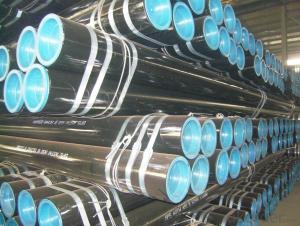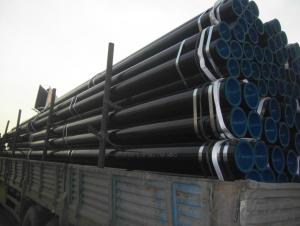Top Supplier of Seamless Steel Pipe with high quality
- Loading Port:
- Shanghai
- Payment Terms:
- TT OR LC
- Min Order Qty:
- 50 m.t.
- Supply Capability:
- 10000 m.t./month
OKorder Service Pledge
OKorder Financial Service
You Might Also Like
Quick Details
| Thickness: | 1 - 80 mm | Section Shape: | Round | Outer Diameter: | 0.25 - 16 inch |
| Place of Origin: | Shandong China (Mainland) | Secondary Or Not: | Non-secondary | Application: | Fluid Pipe |
| Technique: | Hot Rolled,hot rolled and cold drawn | Certification: | API | Surface Treatment: | painted |
| Special Pipe: | API Pipe | Alloy Or Not: | Non-alloy | model number: | ASTM A106-B |
| usage: | mechanical or fluid | WT: | 1mm to 80mm | OD: | 10mm to 406mm |
| surface: | black painted | Grade: | 10#,20#,15CrMo,35CrMo4,30CrMo,16Mn,A53(A,B),A106(B,C),API J55,API K55,St52,St52.4,STPG42,Q345,10#-45#,Cr-Mo alloy,A53-A369,API J55-API P110,ST35-ST52,Q195-Q345 | Standard: | BS 3059-2,JIS G3454-2007,JIS G3455-2005,JIS G3452-2004,GB 3087-1999,GB/T 8163-1999,DIN 17175,ASTM A53-2007,API 5CT,BS,JIS,GB,DIN,ASTM,API |
Packaging & Delivery
| Packaging Detail: | Packing: In bundles, Varnish coating, Ends can be bevelled or square cut, End capped |
| Delivery Detail: | Depends on your order quantity. |
Specifications
1.Seamless pipe professor
2.MTC,ISO,API certificate
3.ASTM,DIN,BS,JIS
4.On time delivery
5.Big store,excellent package.
Liaocheng Tongyun Pipe Industry Co.,Ltd-- Seamless Steel Pipe Professor
1.Our pipe size
OD: 1/8'' to 16'', nomical thickness :Sch5s to XXS
OD 14mm to 325mm, wall thickness: 1mm to 80mm
Also we can produce expand pipe from 20'' to 24''
2.Our pipe including:
ASTM A106 seamless carbon steel pipe
Structure steel pipe
ASTM A179 cold drawn low carbon steel pipe
ASTM A192 steel boiler tubes
ASTM SA213/A519 alloy steel pipe
DIN1629/EN10216-1 Pipe line
DIN17175/EN10216-2 Heat Resisting seamless steel pipe lines
DIN 2391-1 cold drawn or cold rolled steel tube
API SPEC 5CT Tubing and Casing
Cylinders Steel Pipe
3.Package:
Bundle package
Bevelled end or plain end
Painting varnish coating
PVC covered and both ends capped
4.Min order: 10 metic tons.
5.Length: 12meters Max
- Q:What is the lifespan of a steel pipe?
- The lifespan of a steel pipe can vary depending on various factors such as its quality, maintenance, and usage conditions. However, with proper care and maintenance, a well-made steel pipe can last for several decades or even more.
- Q:What are the common defects found in steel pipes?
- Some common defects found in steel pipes include corrosion, cracks, dents, and leaks. Other defects may include misalignment, improper welding, and pipe wall thinning. These defects can lead to reduced structural integrity, compromised performance, and potential failure of the pipes. Regular inspections and maintenance are essential to identify and address these issues promptly.
- Q:RC is it welded steel pipe or galvanized steel pipe?
- Common pipelines in construction are as follows:SC: welded steel pipeTC: wire tubes, thin steel tubesPC: rigid plastic pipesCT: cable trayCP: metal hoseSR: steel grooveRC: water gas pipe
- Q:How are steel pipes used in the manufacturing of furniture?
- Steel pipes are commonly used in the manufacturing of furniture to provide structural support and stability. They are often used as the framework for chairs, tables, and other pieces of furniture. Steel pipes are strong, durable, and can be easily manipulated and welded to create various designs and shapes. Additionally, steel pipes can be finished with different coatings or paints to enhance their appearance and protect against corrosion.
- Q:Can steel pipes be used for signposts or street lighting poles?
- Yes, steel pipes can be used for signposts or street lighting poles. Steel pipes are often chosen for their durability, strength, and resistance to harsh weather conditions, making them suitable for supporting signs or street lighting fixtures.
- Q:What are the safety measures to be followed while working with steel pipes?
- There are several safety measures that should be followed while working with steel pipes. Firstly, it is important to wear appropriate personal protective equipment (PPE) such as safety glasses, gloves, and steel-toed boots to protect against potential hazards. Secondly, workers should be cautious of sharp edges or burrs on the pipes and handle them with care to avoid cuts or injuries. Additionally, proper lifting techniques should be employed when moving heavy steel pipes to prevent strains or back injuries. It is also crucial to secure pipes properly during transport or storage to prevent accidents. Finally, workers should be trained on the safe use of tools and equipment associated with steel pipe work to minimize the risk of accidents or damage.
- Q:How are steel pipes inspected for defects?
- Steel pipes are typically inspected for defects using various non-destructive testing methods such as ultrasonic testing, magnetic particle inspection, and visual inspection. These techniques help identify any cracks, corrosion, or other defects in the pipes, ensuring their structural integrity and quality.
- Q:What are the different types of steel pipe fittings for chemical processing plants?
- There are various types of steel pipe fittings commonly used in chemical processing plants, such as elbows, tees, reducers, couplings, flanges, and valves. These fittings are designed to connect and redirect the flow of fluids within the piping system, ensuring efficient and safe operation in chemical processing applications.
- Q:How are steel pipes used in the infrastructure development?
- Steel pipes are widely used in infrastructure development for various purposes. They are commonly used for transporting water, oil, and gas, as well as for drainage systems and sewage networks. Steel pipes are also used in the construction of bridges, buildings, and highways, providing structural support and stability. Additionally, steel pipes are utilized in underground utilities, such as telecommunications and electrical systems. Their durability, strength, and resistance to corrosion make steel pipes a crucial component in infrastructure development.
- Q:How are steel pipes cleaned and maintained?
- Steel pipes are cleaned and maintained through various methods. The process typically involves removing any debris or rust from the pipes using wire brushes or sandblasting. After cleaning, a protective coating is applied to prevent corrosion. Regular inspections and maintenance checks are also conducted to identify any potential issues such as leaks or weak points, ensuring the pipes remain in optimal condition.
1. Manufacturer Overview |
|
|---|---|
| Location | |
| Year Established | |
| Annual Output Value | |
| Main Markets | |
| Company Certifications | |
2. Manufacturer Certificates |
|
|---|---|
| a) Certification Name | |
| Range | |
| Reference | |
| Validity Period | |
3. Manufacturer Capability |
|
|---|---|
| a)Trade Capacity | |
| Nearest Port | |
| Export Percentage | |
| No.of Employees in Trade Department | |
| Language Spoken: | |
| b)Factory Information | |
| Factory Size: | |
| No. of Production Lines | |
| Contract Manufacturing | |
| Product Price Range | |
Send your message to us
Top Supplier of Seamless Steel Pipe with high quality
- Loading Port:
- Shanghai
- Payment Terms:
- TT OR LC
- Min Order Qty:
- 50 m.t.
- Supply Capability:
- 10000 m.t./month
OKorder Service Pledge
OKorder Financial Service
Similar products
New products
Hot products
Related keywords






























